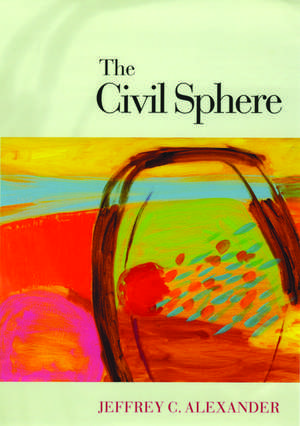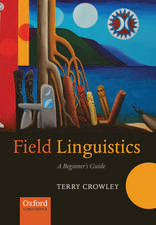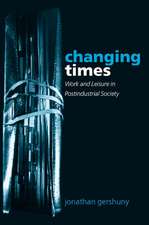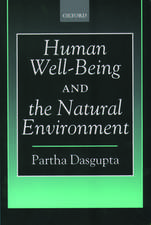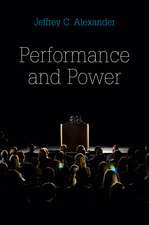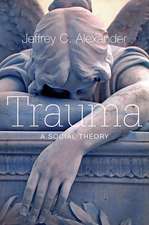The Civil Sphere
Autor Jeffrey C. Alexanderen Limba Engleză Paperback – 28 aug 2008
| Toate formatele și edițiile | Preț | Express |
|---|---|---|
| Paperback (1) | 258.15 lei 31-37 zile | |
| Oxford University Press – 28 aug 2008 | 258.15 lei 31-37 zile | |
| Hardback (1) | 816.48 lei 31-37 zile | |
| Oxford University Press – 17 aug 2006 | 816.48 lei 31-37 zile |
Preț: 258.15 lei
Preț vechi: 283.21 lei
-9% Nou
Puncte Express: 387
Preț estimativ în valută:
49.41€ • 53.69$ • 41.53£
49.41€ • 53.69$ • 41.53£
Carte tipărită la comandă
Livrare economică 10-16 aprilie
Preluare comenzi: 021 569.72.76
Specificații
ISBN-13: 9780195369304
ISBN-10: 0195369300
Pagini: 814
Dimensiuni: 155 x 234 x 43 mm
Greutate: 1.13 kg
Editura: Oxford University Press
Colecția OUP USA
Locul publicării:New York, United States
ISBN-10: 0195369300
Pagini: 814
Dimensiuni: 155 x 234 x 43 mm
Greutate: 1.13 kg
Editura: Oxford University Press
Colecția OUP USA
Locul publicării:New York, United States
Recenzii
The Civil Sphere offers grand theorizing in ways that remind us of both what we are and what we can be. Jeffrey Alexander offers sociology at least a place from which it may begin again.
The Civil Sphere is [a] crowning achievement ... that masterfully reconnects the normative and the empirical in ways that fill an important gap in our cultural discourse today ... A work of great importance, an enduring contribution to the literature on civil society and democracy. Its influence will be felt in political, cultural, and theoretical sociology for decades to come.
A genuine masterpiece ... America's best, and best-known, social theorist defends the project of civil society and its utopia of democratic inclusion
This subtle and hugely informative work ... offers not only acute theoretical discussion of the civil society concept, but also generous and expansive accounts of social movements of race and gender, and the theory and practice of multiculturalism and assimilation (two chapters on the Jewish experience are especially compelling).
The Civil Sphere offers a bold and original thesis about the critically important role that civil societies play in Western democracies. Although I will challenge Alexander's thesis, it is important to state at the outset that The Civil Sphere is a valuable book packed with rich social histories, lively engagements with ancient and contemporary theories, and novel interpretations. There is much to be learned here about the historic and sociological nature of racial, gender, and ethnic oppressions, and the struggles waged to over throw them.
The Civil Sphere is truly a masterful and groundbreaking work, the rare and ambitious kind that does not just contribute to one of the many ongoing conversations in sociology, but brings them together and reorients them. It will undoubtedly confirm and reinforce Jeffrey Alexander's reputation as one of the foremost sociological theorists of our day. Indeed, reading The Civil Sphere generated the same sense of intellectual excitement that I experienced the first time I read Durkheim or Weber or Habermas
The Civil Sphere is... rich in its empirical descriptions and resourceful and suggestive in terms of its conceptual and theoretical framework. The book will challenge and shape the discussions in cultural sociology for many years to come.
From the point of view of contemporary sociology, one of its most distinctive and welcome features is its judicious use of sociological theory and data to advance a particular vision of justice. As such it is a book about the need to place justice at the centre of the sociological enterprise. From the point of view of contemporary critical social theory, one of its most distinctive and welcome features is its insistence that good social theories have a disclosing power that is practically efficacious. As such it is also a book about the illuminating power of theory. Its most significant contribution, however, is its presentation of a strong vision of civil society and the case it makes for taking up the project of civil repair. By arguing persuasively that the civil sphere is a great achievement of Western modernity, and by encouraging us to work towards its realization, the book itself is a remarkable achievement.
The Civil Sphere is a major work that is going to change the state of the debate in many fields ... It aims to provide a new theory of contemporary society, based on a new interpretation of solidarity [that] is a radical challenge to political economy.
A tour de force of sociology, political science, and philosophy, [its] repercussions might be felt for decades to come... This is a book worth reading by both social scientists and the general public, for its persuasiveness can inspire us to imagine that another world is possible
All sociologists, social scientists or writers probably nurture some secret ambition of writing a mega book that will immortalize them by its originality, the persuasiveness of arguments, impact, or its sheer size. For Jeffrey Alexander, this is it. A magisterial book, a contribution to social theory that will be talked about, criticized and never overlooked.
Jeffrey Alexander's The Civil Sphere is nothing less than an attempt to create a new theory of civil society for the 21st century through an almost equally ambitious attempt to reground the discipline of sociology.
A major work of cultural and political sociology, exploring the possibilities of civility as action and civil sphere as a public domain ... The Civil Sphere can taken as conclusive evidence that sociology is alive and well, and more importantly relevant to modern social action.
The Civil Sphere is the best book in sociology that I have read in many years ... It will find its place on the shelf with the other great classics of sociology. [A] great work.
The book is an exercise in forging theory as a tool for democratic practice.
Arguably the most probing and insightful examination of civil society in America since Tocqueville's Democracy in America. He offers a penetrating and original causal interpretation of the success of the Civil Rights Movement, and addresses with understanding and fresh perspective the question of Jewish assimilation in post-civil rights America. Alexander's long awaited book establishes a new benchmark for cultural sociology and social theory with its rigorous theoretical and historical analysis of transformative societal change.
Jeffrey Alexander's The Civil Sphere is the most important, effective, and readable book in his distinguished career. A powerful and provocative account of civil society, this brilliant piece of theorizing is fueled by an expansive moral vision. Alexander punctures the overblown claims of other thinkers both left and right, and stunningly combines theoretical vigor with a subtle, becoming humility in the face of the best achievements and most compelling aspirations of the civil sphere.
An original portrait of civil society which addresses issues which must be addressed if we are to live in peace with those unlike ourselves. The Civil Sphere is remarkable for its clarity and depth of exposition. All readers will benefit from Alexander's ideas: he does not try to batter the reader into submission; instead, he embodies the very ideal of civil society, by inviting the reader to argue with him. In sum, an extraordinary and necessary book.
This is a Herculean labor in which Alexander not only deconstructs the discourse of 'civil society' but reevaluates the entire tradition of political and social thought which attempted to establish, justify, and actualize this abstract idea.
Long recognized as one of the world's foremost intellects, in The Civil Sphere Jeffrey Alexander delivers a masterpiece. In this breathtakingly erudite tour of literature, history, philosophy, and social science scholarship, from Hannah Arendt to Woody Allen, Alexander takes on in a single volume both foundational questions of the human condition and the political exigencies of our day. The result is a book that will wholly transform the conceptual landscape; from this point forward we will recognize that the civil sphere's potential for social justice can only be an ongoing project, never a finished achievement.
The Civil Sphere is at once an energizing ideal for democratic society, and a source of violations of its own ethos. Jeffrey Alexander's well-argued book identifies this crucial level on which liberal democratic societies must operate and offers an insightful and non-reductive account of the struggles against such violations, for what he calls 'civil repair'. He provides fascinating analyses, among other events, of the civil rights movements, and of modern anti-Semitism.
The Civil Sphere is [a] crowning achievement ... that masterfully reconnects the normative and the empirical in ways that fill an important gap in our cultural discourse today ... A work of great importance, an enduring contribution to the literature on civil society and democracy. Its influence will be felt in political, cultural, and theoretical sociology for decades to come.
A genuine masterpiece ... America's best, and best-known, social theorist defends the project of civil society and its utopia of democratic inclusion
This subtle and hugely informative work ... offers not only acute theoretical discussion of the civil society concept, but also generous and expansive accounts of social movements of race and gender, and the theory and practice of multiculturalism and assimilation (two chapters on the Jewish experience are especially compelling).
The Civil Sphere offers a bold and original thesis about the critically important role that civil societies play in Western democracies. Although I will challenge Alexander's thesis, it is important to state at the outset that The Civil Sphere is a valuable book packed with rich social histories, lively engagements with ancient and contemporary theories, and novel interpretations. There is much to be learned here about the historic and sociological nature of racial, gender, and ethnic oppressions, and the struggles waged to over throw them.
The Civil Sphere is truly a masterful and groundbreaking work, the rare and ambitious kind that does not just contribute to one of the many ongoing conversations in sociology, but brings them together and reorients them. It will undoubtedly confirm and reinforce Jeffrey Alexander's reputation as one of the foremost sociological theorists of our day. Indeed, reading The Civil Sphere generated the same sense of intellectual excitement that I experienced the first time I read Durkheim or Weber or Habermas
The Civil Sphere is... rich in its empirical descriptions and resourceful and suggestive in terms of its conceptual and theoretical framework. The book will challenge and shape the discussions in cultural sociology for many years to come.
From the point of view of contemporary sociology, one of its most distinctive and welcome features is its judicious use of sociological theory and data to advance a particular vision of justice. As such it is a book about the need to place justice at the centre of the sociological enterprise. From the point of view of contemporary critical social theory, one of its most distinctive and welcome features is its insistence that good social theories have a disclosing power that is practically efficacious. As such it is also a book about the illuminating power of theory. Its most significant contribution, however, is its presentation of a strong vision of civil society and the case it makes for taking up the project of civil repair. By arguing persuasively that the civil sphere is a great achievement of Western modernity, and by encouraging us to work towards its realization, the book itself is a remarkable achievement.
The Civil Sphere is a major work that is going to change the state of the debate in many fields ... It aims to provide a new theory of contemporary society, based on a new interpretation of solidarity [that] is a radical challenge to political economy.
A tour de force of sociology, political science, and philosophy, [its] repercussions might be felt for decades to come... This is a book worth reading by both social scientists and the general public, for its persuasiveness can inspire us to imagine that another world is possible
All sociologists, social scientists or writers probably nurture some secret ambition of writing a mega book that will immortalize them by its originality, the persuasiveness of arguments, impact, or its sheer size. For Jeffrey Alexander, this is it. A magisterial book, a contribution to social theory that will be talked about, criticized and never overlooked.
Jeffrey Alexander's The Civil Sphere is nothing less than an attempt to create a new theory of civil society for the 21st century through an almost equally ambitious attempt to reground the discipline of sociology.
A major work of cultural and political sociology, exploring the possibilities of civility as action and civil sphere as a public domain ... The Civil Sphere can taken as conclusive evidence that sociology is alive and well, and more importantly relevant to modern social action.
The Civil Sphere is the best book in sociology that I have read in many years ... It will find its place on the shelf with the other great classics of sociology. [A] great work.
The book is an exercise in forging theory as a tool for democratic practice.
Arguably the most probing and insightful examination of civil society in America since Tocqueville's Democracy in America. He offers a penetrating and original causal interpretation of the success of the Civil Rights Movement, and addresses with understanding and fresh perspective the question of Jewish assimilation in post-civil rights America. Alexander's long awaited book establishes a new benchmark for cultural sociology and social theory with its rigorous theoretical and historical analysis of transformative societal change.
Jeffrey Alexander's The Civil Sphere is the most important, effective, and readable book in his distinguished career. A powerful and provocative account of civil society, this brilliant piece of theorizing is fueled by an expansive moral vision. Alexander punctures the overblown claims of other thinkers both left and right, and stunningly combines theoretical vigor with a subtle, becoming humility in the face of the best achievements and most compelling aspirations of the civil sphere.
An original portrait of civil society which addresses issues which must be addressed if we are to live in peace with those unlike ourselves. The Civil Sphere is remarkable for its clarity and depth of exposition. All readers will benefit from Alexander's ideas: he does not try to batter the reader into submission; instead, he embodies the very ideal of civil society, by inviting the reader to argue with him. In sum, an extraordinary and necessary book.
This is a Herculean labor in which Alexander not only deconstructs the discourse of 'civil society' but reevaluates the entire tradition of political and social thought which attempted to establish, justify, and actualize this abstract idea.
Long recognized as one of the world's foremost intellects, in The Civil Sphere Jeffrey Alexander delivers a masterpiece. In this breathtakingly erudite tour of literature, history, philosophy, and social science scholarship, from Hannah Arendt to Woody Allen, Alexander takes on in a single volume both foundational questions of the human condition and the political exigencies of our day. The result is a book that will wholly transform the conceptual landscape; from this point forward we will recognize that the civil sphere's potential for social justice can only be an ongoing project, never a finished achievement.
The Civil Sphere is at once an energizing ideal for democratic society, and a source of violations of its own ethos. Jeffrey Alexander's well-argued book identifies this crucial level on which liberal democratic societies must operate and offers an insightful and non-reductive account of the struggles against such violations, for what he calls 'civil repair'. He provides fascinating analyses, among other events, of the civil rights movements, and of modern anti-Semitism.
Notă biografică
Jeffrey C. Alexander is Lillian Chavenson Saden Professor of Sociology at Yale University, and a Director of the Center for Cultural Sociology. He is also the author of The Meanings of Social Life: A Cultural Sociology (Oxford, 2003).
